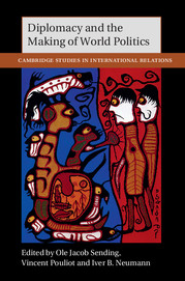Leonard Seabrooke publishes a chapter in Sending, Pouliot & Neuman: Diplomacy and the Making of World Politics
Diplomacy as economic consultancy
This book examines world politics through the lens of diplomatic practice. It argues that many global phenomena of our time, from the making of international law to the constitution of international public power, through humanitarianism and the maintenance of global hierarchies, are made possible and shaped by evolving forms of diplomacy. The study of diplomacy is largely dominated by firsthand accounts and historical treaties, with little effort at theoretical discussion. This book shows how diplomatic studies can benefit from more explicit theorizing, and argues that the study of world politics should pay more attention to what goes on in the diplomatic 'engine room' of international politics.
In his chapter Seabrooke analyzes a set of actors that fills voids between transnational and international networks. Observing that there is wide array of tasks that sit at the interstices of the private and the public, Seabrooke demonstrates how relations between economic profit, humanitarian principles, and the traditional world of diplomacy by instinct breed of actors, whose hallmark is an ability to draw on and wield together skills and expertice from different social spaces. Economic consultancies, the chapter shows, can engage in “epistemic arbitrage” to successfully claim authority over what type of professional approach is appropriate to deal with distinct problems that are part of or have direct bearing on diplomats’ work.
Seabrooke, Leonard: Diplomacy as economic consultancy, pp. 195-219 in Sending, Ole Jacob, Vincent Pouliot & Iver B. Neumann: Diplomacy and the Making of World Politics, Cambridge University Press, August 2015, ISBN 9781107492004.
